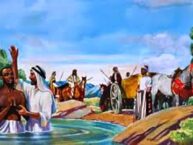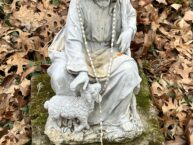 December 8, 2019: May God’s words alone be spoken, may God’s words alone be heard. Amen.
December 8, 2019: May God’s words alone be spoken, may God’s words alone be heard. Amen.
As most of you know if you follow my page on Facebook, my little town in northwest New Jersey, about an hour from here, was hit badly by last week’s storm. Heck, we even made NBC news. Trees everywhere were brought down by the ice that preceded the heavy snow. The carnage was immense – roads & businesses closed, power outages everywhere, and some folks couldn’t get out of their driveway because of large trees blocking the way. So many were without power, myself included, some even just getting electricity restored this past Friday. Then there was the damage to all the beautiful trees.
I spent hours out there batting the branches with a pole to knock the ice and snow off of my trees to save them, but I still lost half of one of my large white pines, the trees that provide these greens we use here on Sundays in Advent, as well as my pear tree. All around the area you could hear the branches of big trees snapping like twigs – it sounded like shotguns being fired. It was truly heartbreaking.
So, when I read the passage from Isaiah for this morning, it resonated – “A shoot shall come out from the stump of Jesse, and a branch shall grow out of his roots.” As I mentioned last week, these passages from Isaiah that we get in Advent are so familiar to us, that we can sometimes just move right past them without taking in what they really mean. Last week it was swords being beaten into plowshares, and this week a vision of the beloved kin-dom of God where the lion and the lamb are best buds. Yet like last week, we need to spend some time on the first verse, and not ignore this stump of Jesse imagery, because it is about a tree that has been cut down – all that is left of it being a stump – a dead remnant of what had been – lifeless and dry.
And as heartbreaking as it was to witness this stump life physically in real time around my home and neighborhood – that is, as we say, a first world problem. What is worse is the metaphor that the prophet was really writing about. That part of our human condition when we are cut down by the troubles of our lives, a weary shadow of our dreams, as dead inside as any tree stump could ever be. And right now, I know there are a number of you here, and many we all know, who feel this way.
The thing is – for many people, this time of year is difficult no matter what is happening in their lives, but for several of you, the past few months have been painful – having to say goodbye to loved ones, struggling with disease yourselves or in those you love, or dealing with difficult circumstances known only to you, and perhaps to me. And then there is the daily onslaught of cruelty and hate seen every day on the news, and sadly often perpetrated, or encouraged, by our own government leaders, the ones in whom we should trust. These are the long dark nights of winter, which seem to echo how we can feel inside at times – as dead as that tree stump.
This is how Advent begins – with death and destruction, right? This is what we have been experiencing over the four weeks of our seven week Advent. But thankfully, today – today is different. Today we make a turn, even if ever so slightly, and begin to see the first hints of light breaking through the darkness.
You know, one of the ways we walk through our seven week Advent is in the use of the ancient O Antiphons – sung by a soloist as an introit at the beginning of our service, and part of the opening of the verses for the hymn O Come, O Come, Emmanuel, which we sing at the Advent Wreath lighting. (to hear this Sunday’s introit sung by our chorister Christopher Dwyer, click here: https://www.youtube.com/watch?v=mVpvaodSckQ)
Each antiphon depicts a different title for Jesus, and find their source in the book of the prophet we read now – Isaiah. They are O Sapientia or Wisdom, O Adonai or Lord, O Radix Jesse or Root of Jesse, O Clavis David or Key of David, O Oriens or Rising Sun, O Rex Gentium or King of Nations, and finally, O Emmanuel or God is With Us.
Today it was O Oriens, or the Rising Sun, the Dayspring, the Dawn. How perfect is that antiphon for us, because a shoot will spring out of that cut down stump, life will emerge from death, and light will spring forth to change night to day. This is why this passage from Isaiah holds such promise for us, as it did for the people of Judah so long ago. The darkness will not take hold of us forever, because the dawn, Jesus our dayspring, is coming soon.
But it is what that new life holds for us, and for the world, that is really what this passage, this Advent, this Jesus we await is all about, and if we are paying attention, we will see that it will change everything – that it is always proclaimed as a breaking forth of justice, peace, and an overturning of the world order. Isaiah says that this new branch shall spring forth with the Holy Spirit resting on him, and he will grow in wisdom and understanding, counsel and might, knowledge and respect for God. And through him, God’s vision of the peaceable kin-dom where former predator and prey live together in peace, and where no one shall hurt another, will become reality for all of creation.
Now it would be reasonable to ask – if that is so, why then do we still have violence, hatred, war, and oppression long after the time of Christ’s death, resurrection, and ascension? Why then can things seem so bleak that we can sometimes feel like that proverbial stump – dead inside and out?
When I was on sabbatical, I studied at Oxford University, and while in Oxford, one of the places I most wanted to visit was the site of the martyrdom of Thomas Cranmer, Hugh Latimer, and Nicolas Ridley, who were burned at the stake following the ascension to the throne of Mary, daughter of Henry VIII, and later known to many as Bloody Mary – more than just a breakfast drink. Anyway, I once heard this story about Ridley, who had been the bishop of London and Westminster.
On the night before Ridley’s execution, his brother offered to remain with him in the prison chamber to be of assistance and comfort. Nicholas declined the offer and replied that he meant to go to bed and sleep as quietly as ever he did in his life. The next day of course he suffered terribly because the fire would not take him quickly. It is then that those famous words of Latimer were said “Be of good comfort, and play the man, Master Ridley; we shall this day light such a candle, by God’s grace, in England, as I trust shall never be put out.” That is indeed true, for these Oxford martyrs as they are called are remembered still. Yet it was his faith in Christ that brought to his heart the peace of God, which he knew would give him rest and the strength of God’s grace for his darkest night and the death that awaited him.
Now, if you were to ask Ridley those questions – if Jesus is really the proclaimed root of Jesse that brings forth the peaceable kin-dom of God, why then is there such violence and hate as would take his life, as we see today – I think he would answer that we are missing the point entirely. I think he would tell us that the promise of God isn’t the dream itself, but the hope, strength, grace, and love (or in Isaiah-speak – wisdom, understanding, counsel, might, and knowledge) that makes that dream a real possibility with every step we take in our life in Christ.
God is a very real presence with us from before time, Christ is alive – then, now, and always. The Holy Spirit has moved over the chaos of our world since the very beginning. And for those reasons, while we strive from day to day to bring about this dream of God for creation, getting ever closer, we are a people of hope even in those times when we are weary and that dream seems so far from our grasp, because we know that God loves us enough to dwell among us despite the cost, that the Holy Spirit breathes new life into our very being with every step forward, and that the dawn of Jesus’ light will always break through our darkest night and fill us with grace to face the new day.
Advent invites us to face the night of our lives with the knowledge of the hope that will be born to the world, born within us, at Christmas. There may be signs of death all around us, real and metaphorical, but the promise of God found in Jesus is that death never has the last word, that love will conquer hate, and that light – his light – Jesus the dayspring – will always break through the darkness if we will let him in.
The lesson of Advent, of this prophetic witness in Isaiah, is that we are a people of hope, a people who will always look East amidst the darkness to the dayspring of God’s love and grace, knowing that in him, and through him, we are changed, and through us, so too is the world. For it is hope that has been, and always will be, what brings forward prophetic visions of what is possible, and the courageous faithful to bring it a step closer into reality, one day, one witness, one act of love at a time.
And so I leave you today with the last verse in the epistle of St. Paul to the Romans we heard this morning, because in this blessing he is reminding us that as followers of Jesus, we abound in hope no matter how dead we may feel, or how dark the world may be, and it is that hope which will change us – change everything – tomorrow, the next day, and for all eternity.
“May the God of hope fill you with all joy and peace in believing, so that you may abound in hope by the power of the Holy Spirit.”
Amen.
For the audio from the 10:30am service, click below, or subscribe to our iTunes Sermon Podcast by clicking here:
The Rev. Diana L. Wilcox
Christ Church in Bloomfield & Glen Ridge
December 8, 2019
Advent 5 – Year A
1st Reading – Isaiah 11:1-10
Psalm 72:1-7, 18-19
2nd Reading – Romans 15:4-13
Gospel – Matthew 3:1-12






